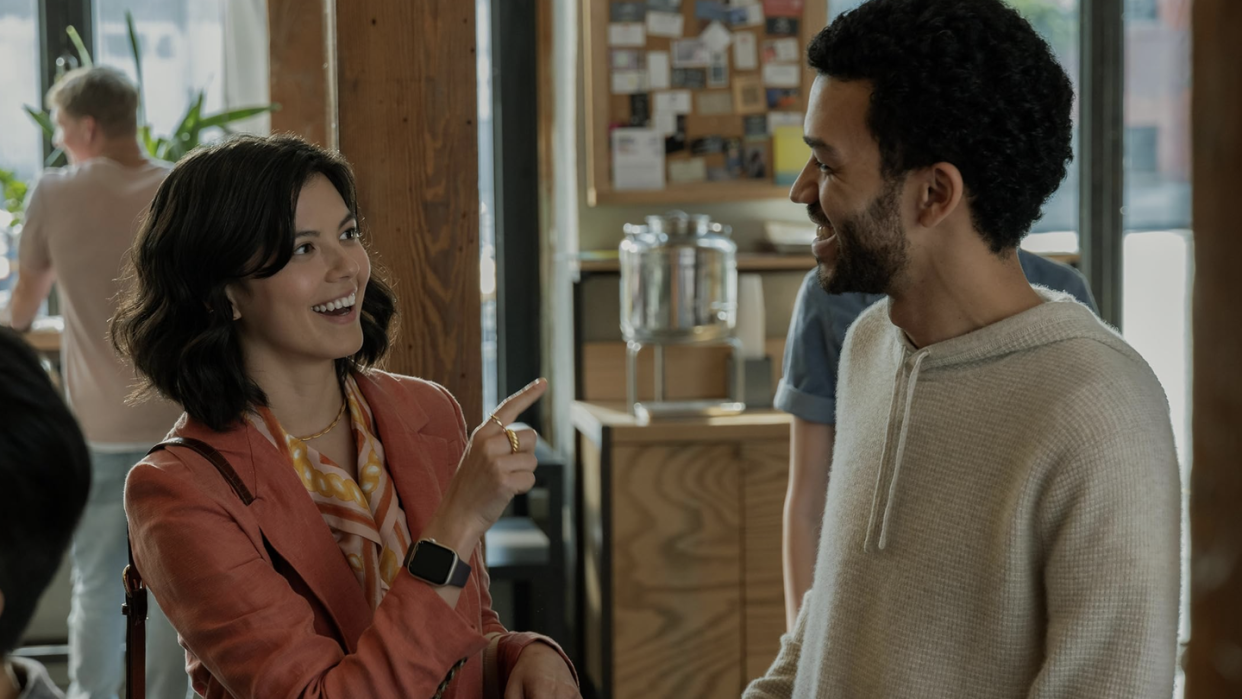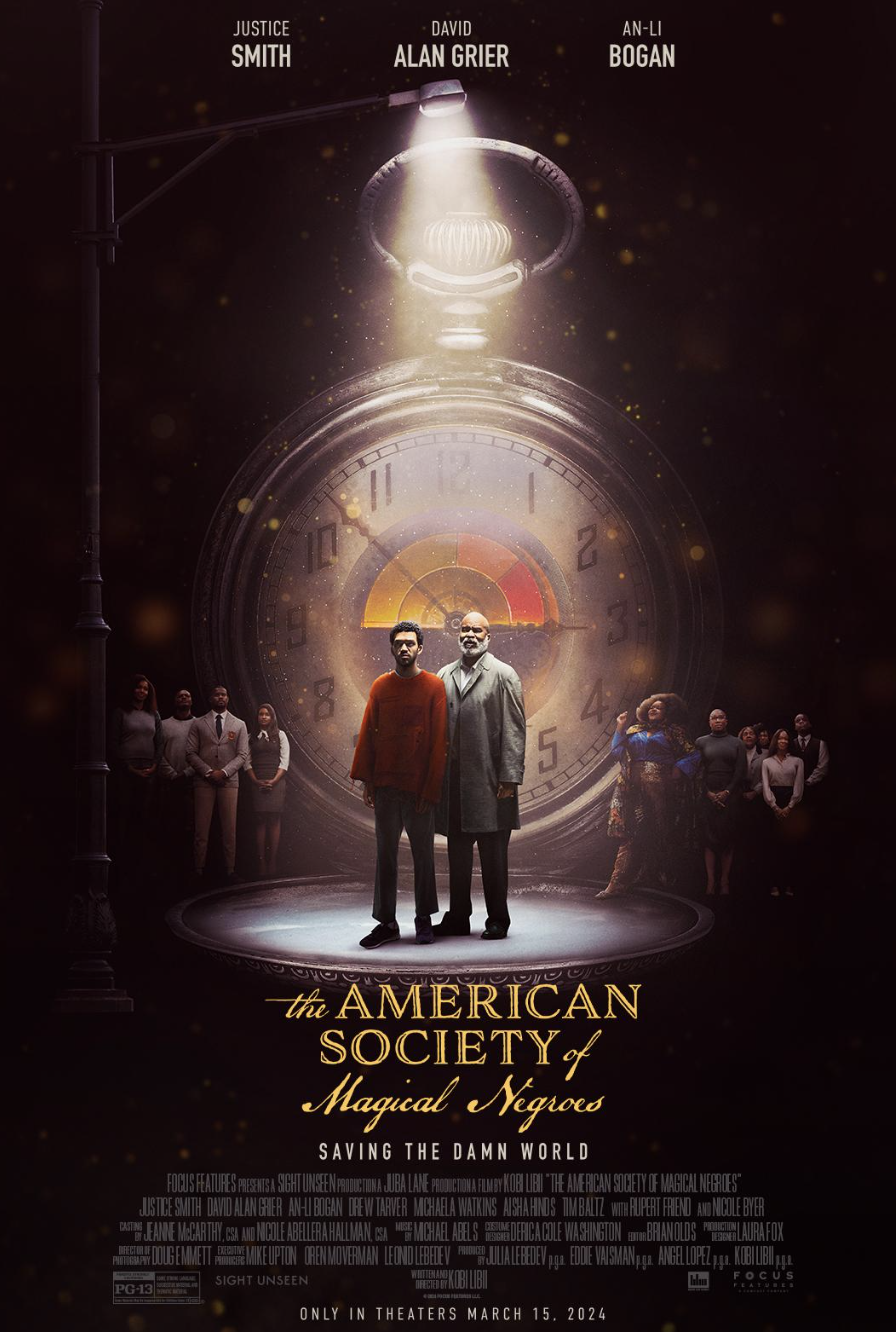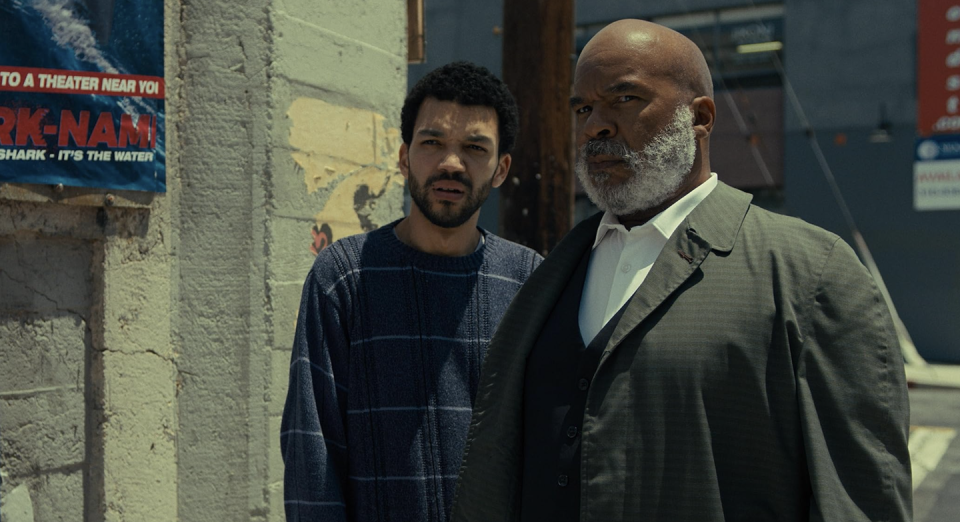‘American Society of Magical Negroes’ Stars Justice Smith and An-Li Bogan Found “Catharsis” on Set

- Oops!Something went wrong.Please try again later.
"Hearst Magazines and Yahoo may earn commission or revenue on some items through these links."
As a person who watches movies, you have probably definitely encountered the “magical negro” trope. But in case you need a quick definition, it is a role played by a Black actor (typically written by a white person) in which their sole function is to prop up the white lead and aid them on their spiritual or emotional journey. They have no interiority of their own, and most of the time they rarely even get a backstory. Basically, they are a prop. If you’ve read The Adventures of Huckleberry Finn, you know what this looks like.
The new satire The American Society of the Magical Negroes, from first-time filmmaker Kobi Libii poses a question: What if being a “magical negro” was an actual job people could have in real life? It essentially takes the trope and gives it all the interiority that is usually missing in the writing of those characters. Justice Smith plays Aren, a young man who is recruited to join the society and is assigned a “client” to work on. An-Li Bogan plays his coworker/love interest Lizzie. The two of them spoke with Cosmopolitan about the initial controversy surrounding the movie, how cathartic it felt to film, and how they interpret the ending’s fun twist.
There was a lot of talk about the movie when the trailer was released, particularly about the title. I’m wondering how you both reacted to that at the time.
JS: An-Li doesn’t have social media, so... [laughs]
ALB: Yeah, I was not super aware of it.
JS: At first I was like, dang. But then I was really empathetic to the response, specifically from Black Twitter. Hollywood has not done right by Black people, so it makes sense that people are skeptical when it comes to movies about race. A lot of people didn’t really know what the trope was, and so they had expectations for the film. So a lot of this press process has been educating people about the trope. Hopefully that mitigates some of the hesitancy and when people see the movie, they’ll realize that it has a really powerful, poignant message about survival, about compromise, and making yourself small in order to appease others.
ALB: It wasn’t too surprising, too, because we signed on to a movie that has the title that it has, you know.

Buy 'American Society' Tickets
fandango.com
I’m curious what books, movies, or shows you both watched to prepare for this film. Are there any references that you found to be particularly helpful that you were able to draw on?
JS: This film is fully pulled from my personal experience. This character goes on a journey that I had to go on, and I knew that I could play the layers of that journey. Like, the emotional dissonance of trying to rid yourself of discomfort, so you appease the people who are making you uncomfortable, which then allows them to further make you uncomfortable. I understand that vicious cycle. I had to liberate myself from that vicious cycle, so I was all the resources I needed.
ALB: I also felt like most of this character was already inside me. There are always films and actors that I re-familiarize myself with before doing any acting. But for this material, it felt already inside me.
The love story between your two characters is so lovely. When did you both meet for the first time and what was that meeting like? Do you remember anything specific about meeting each other?
ALB: You said, “I’m a Leo.”
JS: Is that what I said? That’s so funny. We met during the chemistry read. We did Zoom chemistry reads where An-Li was absolutely amazing.
ALB: But we met for the first time at rehearsals in L.A. at that warehouse. And then we, like, had salad together after.
JS: An-Li is just so alive. She’s such an alive performer and an innate listener, and I am so happy that she’s not yet jaded by this industry, that she still values the craft of acting. I’m very grateful for her.
ALB: I’m very grateful that Justice was my first serious co-lead on a film. It was so easy.
What is it like to try to establish rapport with someone through a Zoom screen? Especially in a chemistry read setting, where the vibes are the whole point.
JS: It’s just about listening. It’s about reacting. Kobi allowed us to be free with the language. You can see a lot of chemistry when you allow your actors to be free with language, because you see how they fill the space, what else they choose to say, between them. Me and An-Li just immediately saw each other, immediately knew how to flow between comedy and drama, how to prioritize truth, and how to listen.
ALB: Normally these Zoom things are, like, horrible for me. The person’s not there and then you also have to act, but it was really fun. That’s always a good sign. And then when we got to be in person, it just adds another level.
Justice, when you say the director allows you to be free with your language, what does that mean practically? Deviating from the audition sides you’ve been given?
JS: Yes, deviating from the text. Kobi obviously wrote a very funny, very good script. But he encouraged us to be alive with the text. So what that looks like is, you know, maybe massaging the beginning of it, adding a vocal filler here or there, pitching a joke, or talking over each other. Things that we do in real life. In film everyone likes to be polished and they speak in complete sentences. But in real life, we stumble up our words and we stutter and we smack and we miss a joke and we laugh uncomfortably. All that good juice that makes up performance authentic, he allowed that messy stuff.
ALB: And we were so well set up with the writing that we were going off of, so with the improv, it felt like we could be really free because the scene that we were playing, what was actually happening was already clever, funny. So to play the circumstance with our own words was great.

Although this movie is a comedy and is very funny, we’re dealing with some really tough subject matter. I’m wondering how you both were able to check out during filming and take care of yourselves.
JS: The experience my character goes on in the film is an experience that I’m familiar with. It’s something that I do have to live with. But I experienced so much catharsis shooting this film and using this defense mechanism, this people-pleasing, making myself smaller defense mechanism in my art. It was really powerful for me to tell my story through Kobi’s lens. Luckily, the set was so smooth, and Kobi really supported everyone and trusted everyone. It was an amazing time on set. It was so fun and light. None of that dark heaviness.
Justice, you said it was really liberating working Kobi because he looks like you and understands you on a deeper level. I’m wondering if this experience has changed how you think about your work going forward and what projects you want to take.
JS: It really has. It’s now my reference point for how I want my experiences on set to go. I just felt so seen as a person but also as an artist and so respected. He really treated me as a collaborator. I cannot wait to work with him again. I really hope I get to, but unfortunately, now when I read projects and I talk to directors, I compare them to Kobi.
ALB: I’m screwed because this is my first film. I was like, Wow, everyone’s so respectful! This is great!
What has been your favorite reaction to the film so far?
JS: I remember this one guy when we did a panel, he asked this question, and before he asked, he disclaimed it by saying he loved the movie and that the big monologue stuck with him. And the way he said it, he’s like, I can’t stop thinking about it, and there was something so powerful about the way he said it. It was almost introspective, and he was looking down when he said it. It meant so much to me because I see so much of myself in this film, and I want other young Black men to see themselves in this film. And when I heard him say that I was like, Oh, yeah, that’s why we made this. It’s for that revelation.
[Editor’s note: There are spoilers ahead for the ending of The American Society. You’ve been warned.]
An-Li, it’s revealed at the very end of the film that your character is in a magical society of her own. It did make me curious. If she’s also in her own society, who do we think her client was? Jason? Who do we think she was working on?
ALB: Who indeed!?
JS: It really reframes the whole movie. She could be working on Jason. She could also be working on Aren, my character. The way they meet is such a stereotypical rom-com meet-cute. It’s intentional, obviously. That’s the society that she’s from—these supportive wives and girlfriends who come into these men’s men lives and they move their hair this exact kind of way...
ALB:...they solve all their problems. My life’s work.
You Might Also Like

